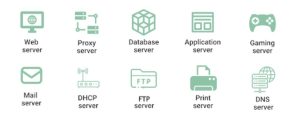The Significance of Server Management in IT

In the realm of IT, servers play a pivotal role, facilitating functionalities such as web hosting, data storage, email services, and application operations. Their crucial nature necessitates consistent oversight and upkeep to guarantee their longevity, optimal performance, and security. This piece serves as a comprehensive guide for decision-makers, shedding light on the nuances of server management and how both small and large businesses ensure their data repositories remain in top shape.
Understanding Server Management
Server management can be defined as the meticulous process of overseeing a server to guarantee its peak and secure performance. The primary aim of this IT endeavor is to maintain the server and its related systems in a consistent and desired state. This involves:
- Reducing server lags and potential downtimes.
- Addressing hardware issues and ensuring its maintenance.
- Regularly updating software.
- Crafting and executing system architectures.
- Monitoring applications on the server, noting their status, uptime, and recurrent problems.
- Troubleshooting when necessary.
- Conducting fault management assessments.
- Instituting solid backup methodologies and cybersecurity measures.
- Observing server traffic for any anomalies.
- Adapting servers to evolving business requirements.
Server management might be the responsibility of a single individual or a dedicated team, depending on the IT infrastructure’s scale. While some businesses manage servers internally, many opt to outsource this task. It’s essential to select a service provider that aligns with your needs.
Types of Servers and Their Management Needs
Both servers located in data centers and those in cloud environments require management. Commonly managed server types include:
- FTP Servers: Facilitate data transfers between a server and devices.
- Web Servers: Host websites that store, process, and deliver web content to users’ browsers when requested as web pages, to users’ browsers when requested
- Virtual Servers: Operate on Virtual Machines (VMs).
- Proxy Servers: Manage communication between a client and an external server.
- Database Servers: Store vast data quantities.
- Gaming Server: A game server is a specialized computer responsible for hosting and managing online multiplayer video games, allowing players to connect, interact, and compete within a virtual game world.
- Application Servers: House and operate web applications and plugins.
- Mail Server: A mail server is a computer or software application that manages the sending, receiving, and storage of email messages.

The primary objective of server management is to enhance efficiency and performance while safeguarding IT operations.
Key Server Management Tasks
- Setup and Configuration: This involves setting up the server, and configuring software, add-ons, and functionalities. The process varies based on server types, and configurations differ based on use cases and server types.
- Hardware Management: Ensuring the hardware’s health is paramount. Monitoring components like the CPU, RAM, and hard drive is essential. Additionally, monitoring the server’s temperature is crucial to prevent overheating.
- Software Management: Regularly updating and monitoring server software is vital. This includes understanding software dependencies, keeping the software and firmware updated, and ensuring the removal of outdated or redundant programs.
- Server Monitoring: Continuous monitoring is crucial for optimal server performance. This includes tracking metrics related to hardware, processes running on the server, and other performance indicators.
- Server Security: Implementing robust security measures is a core aspect of server management. This encompasses a range of activities from installing antivirus solutions to conducting vulnerability assessments and enforcing stringent security protocols.
- Backup and Recovery: Regular data backups are essential for server security. This involves creating backups multiple times a day, ensuring limited access, and optimizing recovery objectives.
Who Benefits from Server Management?
Every entity, from solo entrepreneurs to large enterprises, that relies on a server needs server management. The decision boils down to whether to manage servers internally or outsource the task. If managed in-house, a server management tool is indispensable.
The Perks of Outsourcing Server Management
Outsourcing server management offers several advantages:
- Access to top-tier professionals.
- Reduced operational expenses.
- 24/7 reliable support.
- Elimination of time-intensive tasks.
- Swift server setups and updates.
In Conclusion
Effective server management is non-negotiable. It’s the key to preventing downtimes, security lapses, and performance hitches. It’s imperative to either equip your team for server upkeep or engage experts to ensure seamless and efficient operations.





